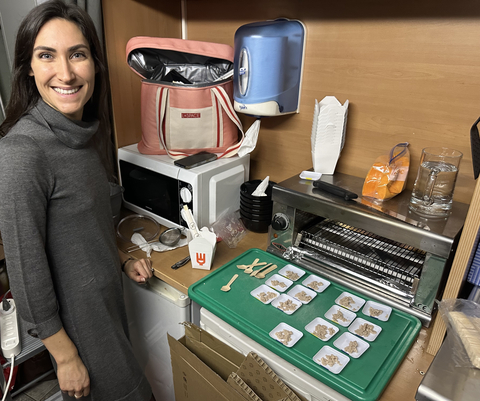On January 16, heads of state, industry experts and business leaders gathered for the annual World Economic Forum conference at Davos. At the same time, a smaller, though no less consequential, event took place just 10 minutes away at Sonas Irish Pub. Food startup Fork & Good conducted the city’s first blind tasting of hybrid cultivated meat to gather feedback from an eclectic group of 40 people.
This press release features multimedia. View the full release here: https://www.businesswire.com/news/home/20240201170271/en/

Fork & Good prepares cultivated meat-mix (Photo: Business Wire)
Participants each received two small dishes distinguished by blue and yellow stickers. One contained 100% conventional pork and the other a blend of 30% cultivated and 70% conventional pork. (Willing vegetarians also had a chance to enjoy dumplings made with a blend of plant and cultivated pork)
“Mixing cultivated meat with conventional meat has many advantages,” said Fork & Good Chief Scientific Officer Gabor Forgacs. “It helps alleviate the rising supply chain and environmental challenges meat producers face. It also allows for the gradual introduction of cultured meat through products consumers are already used to.”
Perhaps most importantly, it tastes just like meat — because it is 100% meat. As Fork & Good co-founders expected, participants at the blind tasting found no major difference between the two samples. An informal poll after the tasting showed more than half of the group preferred the 30/70 blend over conventional meat on its own. The group was equally split when asked to guess which dish contained cultivated meat.
The tasting was led by Fork & Good CEO Niya Gupta, who said, “We are aiming to serve everyone everywhere with affordable meat so it’s exciting to get input in this open and democratic way. We had everyone, from an American professor to a Swedish nonprofit worker to a Chinese student — even a regular Swiss person walking in off the street looking for a beer. Their feedback has been critical to us as we continue our product development journey.”
One of the participants, global data science leader Dr. Richard Kerr, said, “I wasn’t able to tell the difference between the samples, to the point that I thought it was going to be revealed that all the samples were 100% cultured. I love the idea, and will continue to follow [Fork & Good’s] progress with interest.”
The lunchtime tasting was a part of UnDavos, an informal entrepreneurship-focused gathering that takes place the same week as the WEF conference. Mark Turrell, founder of UnDavos and CTO of Fresh Solutions AI, invited Fork & Good to present their product at a “meal for the future” event. “It was amazing to physically experience technology being integrated into our food — the food in our mouths,” Turrell said.
In addition to the blind tasting, Fork & Good was invited to the main WEF conference as a Technology Pioneer, one of just 100 early-stage startups developing innovative technologies to address global challenges. Gupta participated in back-to-back meetings and roundtables, including a bilateral meeting with one of the world’s largest meat producers who couldn’t tell the difference between conventional meat and Fork & Good’s hybrid cultivated meat.
Founded in 2018, Fork & Good launched its pilot facility in Jersey City, New Jersey. The facility is already capable of producing six to ten times more meat per square foot than is currently possible by conventional means. Fork & Good’s cultivated meat is ready for market, pending regulatory approval by the FDA and USDA.
ABOUT FORK AND GOOD
From its facility in Jersey City, Fork & Good is on a mission to grow the best of meat for everyone, everywhere. The company takes a novel approach to cultivating meat by growing muscle cells directly in proprietary bioreactors for maximum flavor and nutritional value—while drastically reducing the amount of land and water used in conventional livestock production. The team has 150+ years of combined experience that spans food, agriculture, and science, and is committed to helping build the industry in a safe, transparent way. Learn more at: www.forkandgood.com.
View source version on businesswire.com: https://www.businesswire.com/news/home/20240201170271/en/